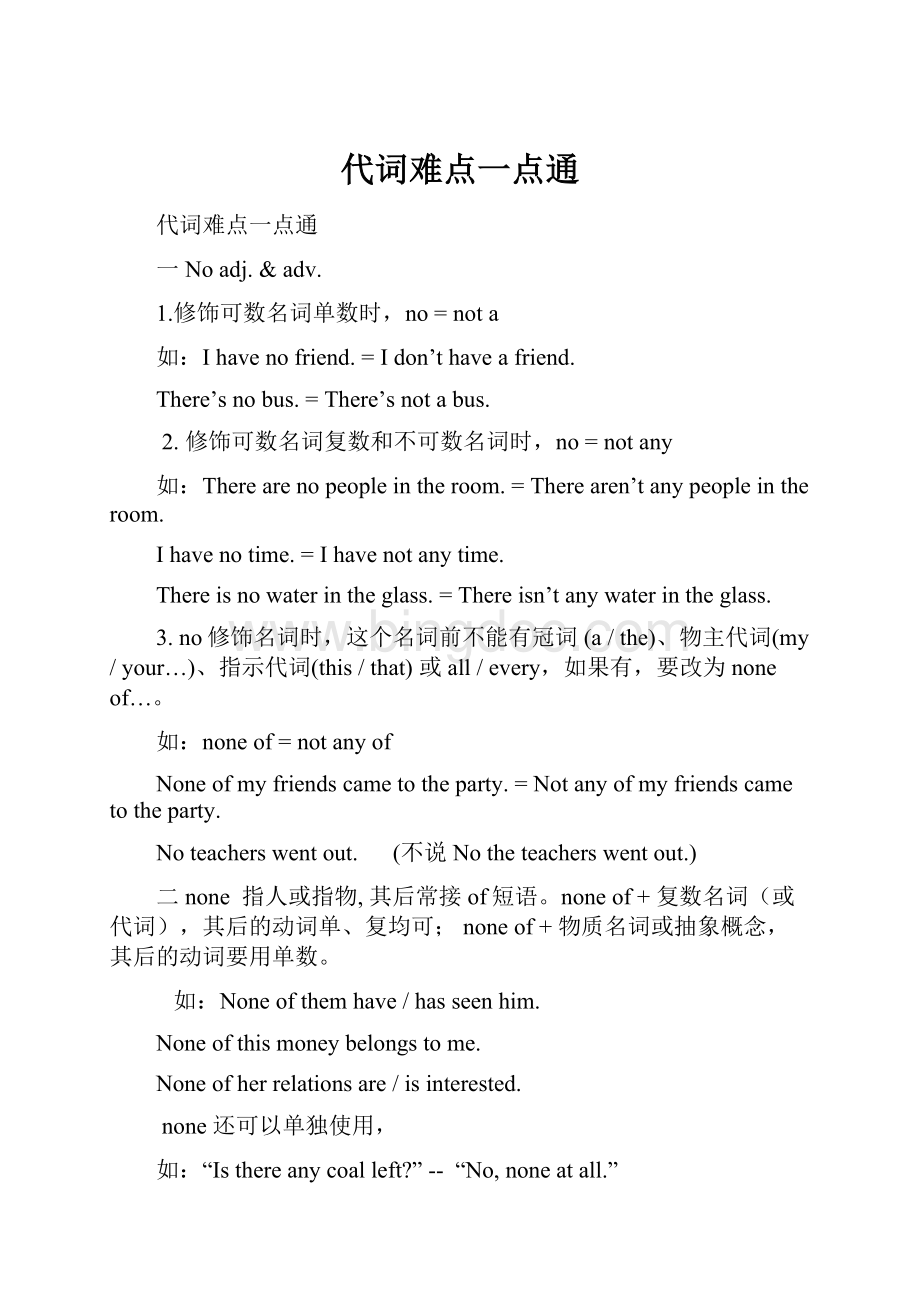代词难点一点通.docx
《代词难点一点通.docx》由会员分享,可在线阅读,更多相关《代词难点一点通.docx(17页珍藏版)》请在冰点文库上搜索。

代词难点一点通
代词难点一点通
一Noadj.&adv.
1.修饰可数名词单数时,no=nota
如:
Ihavenofriend.=Idon’thaveafriend.
There’snobus.=There’snotabus.
2.修饰可数名词复数和不可数名词时,no=notany
如:
Therearenopeopleintheroom.=Therearen’tanypeopleintheroom.
Ihavenotime.=Ihavenotanytime.
Thereisnowaterintheglass.=Thereisn’tanywaterintheglass.
3.no修饰名词时,这个名词前不能有冠词(a/the)、物主代词(my/your…)、指示代词(this/that)或all/every,如果有,要改为noneof…。
如:
noneof=notanyof
Noneofmyfriendscametotheparty.=Notanyofmyfriendscametotheparty.
Noteacherswentout. (不说Notheteacherswentout.)
二none 指人或指物,其后常接of短语。
noneof+复数名词(或代词),其后的动词单、复均可;noneof+物质名词或抽象概念,其后的动词要用单数。
如:
Noneofthemhave/hasseenhim.
Noneofthismoneybelongstome.
Noneofherrelationsare/isinterested.
none还可以单独使用,
如:
“Isthereanycoalleft?
” --“No,noneatall.”
“Howmanystudentsarethereintheclassroom?
” --“None.”
“Howmanyofthebookshaveyouread?
” --“Noneatall.”
“Howmuchwaterleftisthereinthebottle?
” --“None.”
比较:
Noonethinksheisclever. (=Nobodythinksheisclever.)
Nooneknowswhattheyfoughtabout.
Noonelikesapersonwithbadmanners.
“Whoareyouspeakingto?
” -----“Noone.” (or:
Nobody)
“Who(m)didyouseeenterthelonelyhouse?
” ----“Nobody.” (or:
Noone)
1) none用来指人或物;noone(=nobody)主要用来指人(=notevenone意为:
连一个也没有,语气重)。
2) none常接of短语;noone不能接of短语。
3)作主语时,none后面的名词为复数时,动词可用单数或复数;noone只用作单数,动词也用单数。
4) none往往用在一定的范围内;noone没有范围限制。
5)回答who引导的问句用noone或nobody;回答howmany或howmuch引导的问句用none。
6)当谈到两个人或事时,不用no或none,而用neither。
三 few/afew
1 few修饰可数名词复数。
2 few(=notmany;hardlyany)含否定意义;afew(=some;several;asmallnumberof)含肯定意义。
3 notafew=nofew=quiteafew=agoodfew=many。
4 当few受every,last,past,next,some,very等词所修饰时,表示肯定意义,few之前不再有冠词。
如:
Inthelastfewminutes,hecheckeduphispaperagain.
Ittookussomefewdaystorepairthemachine.
Theyareveryfewinnumber.
Thereweretoofewofthem.
Hegoestoseehisgrandmaeveryfewweeks.
5 在非正式文体中很少见,一般用或代替,
如:
Onlyafewpeopleattendedthemeeting.
四 little/alittle
1 little修饰不可数名词,表示“量”。
2.little含否定意义(反义词:
much);alittle含肯定意义(反义词:
none)。
3 在非正式英语中,一般很少用little,常用notmuch,onlyalittle来代替,
如:
Wehaven’tgotmuchmoney/time.
五each
1.each作为限定词用(作定语),后接单数可数名词,
如:
Eachdayisbetterthantheonebefore.
Thereisalineoftreesoneachsideofthestreet.
【注】:
可以说:
eachsister,mysister(s),但不可以说:
eachmysister。
2当名词前有另一个限定词(冠词、物主代词、指示代词)时,要用eachof,(这时的each是代词)后接复数名词,
如:
EachofmyauntsgavemesocksforChristmas.
I’veinvitedeachofthestudentsinturn.
【注】:
名词前没有其他限定词不用eachof,所以不能说:
Eachofaunts…。
3each作为代词,也可以用在人称代词前,这时须加of,作主语时动词要用单数,
如:
Eachofthem/ushadatry.
Eachofthemisbroken. (cf.Eachofthecupsisbroken.)
Eachofthemhashisownduty.
4each本身可以独立用作代词,后面不接名词,不用of,作主语时动词要用单数,
如:
Eachhashismerits.
Ihadsomecrazydreamslastnight.Eachwasfunnierthanthelast.
【注】:
在这种情况下,以用eachone为宜,显得更自然:
Eachonewasperfect.
Eachonewasfunnierthanthelast.
5each可以跟在主语之后作同位语,这时主语和动词均为复数,
如:
Weeachhaveourownattitudetobringingupchildren.
Theboyseachhaveanewbike.
【注】:
动词为be或有助动词时,each应放在其后。
Hissistershaveeachmarriedbusinessmen.
Thewitnesseswereeachperfectlycertainofwhattheysaid.
6each还可以放在间接宾语之后,但一般不用在直接宾语的后面,
如:
Shesentthechildren/themeachapresent.
不说:
Shekissesthemeach.
7each还可以作副词,
如:
Givethemtwobookseach. (=Giveeachofthemtwobooks.)
Thestudentshavetenbookseach.
六each/every
1.each从个体着眼,强调“每个”人或物的个别情况,表示“各个”;every从整体着眼,强调共同性,意为“个个都”(=all),但有时在句中使用时并无太大的区别,
如:
Youlookmorebeautifulevery/eachtimeIseeyou.
Iknowevery/eachmemberofthefamily.
Each/Everymancarriedaboxonhisshoulder.
2each用于两者或两者以上;every用于三者或三者以上。
3each可以作形容词、代词、副词;every只作形容词,只能在句中作定语。
可以说:
eachofthestudents / eachofthem
不说:
everyofthestudents/everyofthem
也不说:
Everygoesinforsports./Everywasempty.
但可以说:
everyoneofthestudents/everyoneofthem
Everyone(oftherooms)wasfullofpeople.
4every后跟单数名词,所组成的短语作主语时,动词用单数,
如:
EveryparkiscrowdedonSunday. (cf.AlltheparksarecrowdedonSunday.)
Hehasreadeverybookonthesubject. (=…allthebookson…)
5every可以表示“每隔……”,而each则无此意。
IgotoPariseverysixweeksorso.
6every可以和not连用,表示否定,而each不行。
Noteverymancandothiskindofwork. (=Everymancannotdothiskindofwork.)
(cf.Notallmencandothiskindofwork. =Allmencannotdothiskindofwork.)
七one
1.one用来指包括说话者在内的、泛指的任何人。
它只用于谈论泛指的人们,不专指某一个个人或确定的一批人、某一特定事件,也不能用来指不包括说话者在内的一群人。
2.one可以作主语或宾语,其所有格是one’s,反身代词是oneself。
在美语中,句首用了one,后面可以用he,his,him和himself,
如:
Onemustloveone’scountry.
Onecan’tbetoocareful,canone?
Onecannotsucceedatthisunlessone/hetrieshard.
Oneshouldconstantlythinkofone’s/hisweakness.
3.one常用来代替或避免重复某个名词(单数可数),
如:
“Doyouneedmypen?
” “No,thanks.Ihavegotonemyself.”
Ihaven’tgotaraincoat.I’llhavetobuyone.
I’mlookingforahouse.I’dreallylikeonewithagarden.
【注】①:
one所代替的是同类事物中的“一个”,theone所代替的是同类事物中特指的“另一个”;it所代替的是前面提到过的同一事物;that可代替前面提到过的名词,用于特指,它只能代替事物,不能代替人(定语从句除外),
如:
IneedabikebutIhavenomoneytobuyone.
IneedthebikebutIhavenomoneytobuyit.
Thisfilmisnotsogoodastheonewesawlastweek.
②:
one前不仅可以有冠词,还可以有定语;但one的前面如果没有形容词,不可用a,
如:
“Doyouhaveabike?
” “Yes,Ihaveone.Ihaveanewone.”
Yourquestionisadifficultone.
IlikethisbookbetterthantheoneIreadlasttime.
Thewhitehorseisstrongerthantheblackone.
4one的复数形式是ones,用来代替可数名词复数,
如:
Ihaveanewpenandseveraloldones.
Idon’tlikecolouredenvelopes.Ilikewhiteones.
5.one不能代替不可数名词,如:
milk,energy,happiness等。
6.oneof之后用名词复数或复数代词(us,them,you),而动词用单数,
如:
Oneofmyfriendsisapilot.
Oneofyourcatshasdisappeared.
7 通常不说:
yourone(s),myone(s),hisone(s)
而说:
yours,mine,his
Yourcarisn’tfastenough.Let’stakemine. (不说:
myone)
但有形容词时,则可以说:
Let’stakemynewone.
八all
1.作主语:
Allofmyfriendslikeriding.
AllIwantisaroomsomewhere.
Allisgoingwell.
Allarehere.
2.作宾语:
I’llgiveyouallyouwant.
I’vereadallofthebook.
3.作表语:
That’sallfortoday.
Isthatallyouwanttosay/know?
4.作定语:
Allchildrencanbenaughtysometimes.
Allmatteriscomposedofatoms.
5.作同位语:
Myfriendsalllikeriding. (在动词之前)
Theyhaveallgonetothepark. (在第一个助动词之后)
Wearealltired. (在be动词之后)
Howkindyouallaretome!
(强调表语并将其提前时,all在主语之后,系动词之前。
)
【注】①:
all作主语,若指人,表示三者以上的人,动词用复数;代表整体物、抽象概念或情况时,表示“一切;所有”,动词用单数。
②:
在人称代词前面,只能用allof,不用all,且代词用宾格,动词用复数。
可以说:
allofus,allofyou,allofthem
不说:
allus,allwe,allyou,allthem或allthey
③:
名词前有冠词、指示代词、所有格或其他限定词时,既可用all,也可用allof,意思不变,
如:
all(of)thepapers, all(of)myfriends, all(of)thewater
若名词前没有冠词、指示代词等,只可以用all,不用allof。
AllroadsleadtoRome.
Allhopeisgone.
Allwhiskyisexpensive.
△特例:
allone’slife 如:
allhislife,allmylife。
④:
all还可以放在直接宾语或间接宾语之后,但这个宾语必须是人称代词,
如:
Lovetoyouall. (不说:
Lovetothefamilyall.)
I’veeatenthemall. (不说:
I’veeatenthecakesall.)
I’vefinisheditall. (不说:
I’vefinishedtheworkall.)
但:
all不能用于表语之后,不可以说:
Thisisitall.
九all/every
all表示“大家都……”,或者“全部……都”,强调整体,注意力不在个体;every表示整体的每个个体,尽管每一个个体加在一起也相当于一个整体,但不把各别个体单独看待,而当作整体的代表,从每一个个体着眼,
如:
Hehasreadallthebooksontheshelf.
Hehasreadeverybookontheshelf.
Everyhouseinthestreethasbeensold.
Allthehousesinthestreethavebeensold.
Noteverymancandothiskindofwork.
Notallmencandothiskindofwork.
1. all可以作主语、宾语、表语、定语;every只能作定语,不可以说:
everyofthem。
2. all之后可以跟the或其他限定词;而every不能,不可以说:
everythestudent(s)。
3. all可以与复数名词或动词连用;every之后的动词只能是单数。
4. all还可以跟单数名词连用,表示everypartof(整个地);every则没有此意,
试比较:
Shewashereallday. (整天)
Shewashereeveryday. (每天)
5. every可以表示“每隔……的”,“每……中的”;all则没有这个意思,
如:
everythreedays/chooseoneoutofeverytenboys
6. 不过,every的合成词可以起名词作用,作主语、宾语等,
如:
Everyoneishere. (=Allarehere.)
Everythingisgoingwell. (=Allisgoingwell.)
十 both
(一)与名词或代词连用:
1.名词前没有限定词(如:
冠词、物主代词、指示代词),both单独用,不加of,
如:
BothchildrenhavebeentoBeijing.
Bothanswersarecorrect.
2.名词前如果有限定词,both或bothof均可,
如:
Both(of)thegirlsareverydiligent.
Both(of)mychildrenhavebeentoBeijing.
Iwantboth(of)thesebooks.
3.与人称代词连用,要用bothof,人称代词为宾格,
如:
Bothofthem/uswerebornonMarch19th.
Theletter’saddressedtobothofthem/us/you.
不说:
bothwe/bothus/boththem
但可以说:
usboth/themboth,如:
Heinvitedusboth.
4.both前面不能加冠词,
不可以说:
ThebothchildrenhavebeentoBeijing.
(二)与动词连用(both指句子的主语):
1.在实义动词之前,如:
Webothlikeriding.
2.在be动词之后,如:
Youarebothwrong.
3.在第一个助动词之后,如:
Theyarebothwaitingforthebus.
Wemustbothgothere.
4.强调表语并将其提前时,both位于主语之后,系动词之前,如:
Howsillyyoubothare!
5.在疑问句的简略回答中,both须放在助动词或情态动词之前,如:
“Werebothofthecupsbroken?
” “Yes,theybothwere.”
“Whocandoit?
” “Webothcan.”
(三)作代词单独使用:
Bothareright.
I’lltakeboth,please.
记住下列句子:
Bothcatsareasleep.
Boththecatsareasleep.
Bothofthecatsareasleep.
Thecatsarebothasleep.
十一either/neither
1.作为限定词,用于单数可数名词之前,不与其他限定词(如冠词、物主代词、指示代词)同时使用;either或neither之后不加of,所构成的词组作主语时,动词用单数,如:
可以说:
eitherroom,neitherroom,theroom,myroom;
不可以说:
theeitherroom,eithermyroom,neitherhisparents.
例句:
EitherdayisOK.
Youmaytakeeitherroad.
Neithersentenceiscorrect.
Neitherdictionarybelongstome.
注① either或neither都不能用作同位语。
注② either有时可以表示“两个都”,特别是后接side或end时,如:
Therearerosesoneithersideofthedoor. (=bothsides)
2.作为代